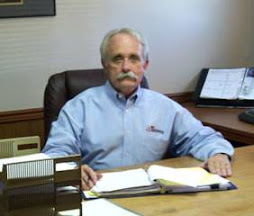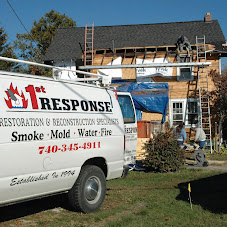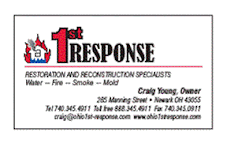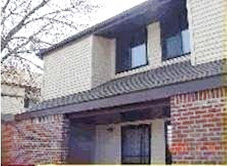Showing posts with label damage. Show all posts
Showing posts with label damage. Show all posts
Thursday, May 23, 2013
Water Damage
Damage Assessment
Labels:
1st response.newark,
24/7,
board up,
central ohio,
damage,
fire,
full service contractor,
Licking,
mold,
ohio,
Perry,
smoke,
water
Monday, May 21, 2012
Smoke Damage
Smoke-damaged walls are an inevitable part of a house fire. Smoke and soot can travel throughout your home and saturate any surface, which can be difficult to remove without the proper supplies, expertise, and experience in using them.
Professional restorers have years of experience and know how to use restoration products safely.
You should hire a professional restoration company to restore your home after a fire, and having them clean and repair smoke-damaged walls is a big part of fire damage cleanup.
Professional restorers have years of experience and know how to use restoration products safely.
You should hire a professional restoration company to restore your home after a fire, and having them clean and repair smoke-damaged walls is a big part of fire damage cleanup.
Tuesday, February 28, 2012
Some of the benefits of working with 1st Response
A full-service construction company.
A Certified Firm with the INSTITUTE OF INSPECTION, CLEANING AND RESTORATION CERTIFICATION.
We are a Preferred Contractor for most major insurance companies, and have worked with over 50 other insurance firms.
The Staff personally responds immediately to every call.
Emergency service 24 hours a day, 7 days a week.
Our Certified, trained technicians use the latest technology available for restoration and reconstruction work.
With 1st Response you will receive a timely and accurate estimate.
Thursday, March 18, 2010
Spring Cleaning Tips
INSIDE
CLEAN CARPETS as soon as the spring mud season is over. Vacuum them thoroughly, then shampoo with a spray foam or powder or rent a steamer from a hardware store for an even deeper clean.
CLEAN AND VENTILATE THE BASEMENT. Open windows and give your cellar a good airing, then sweep the area thoroughly or vacuum.
START UP YOUR DEHUMIDIFIER. Clean it, make sure that it's in working order, then run it in a humid basement or partially underground room. Dampness during spring and summer months causes mildew.
OUTSIDE
IF YOU HAVE A SWIMMING POOL, ensure that cleaning equipment is in good shape and your water-testing kit is complete. Stock up on chemicals. If you lowered the water level in the fall, fill the pool now.
PUT UP WINDOW BOXES. Dump out old soil and clean the boxes thoroughly. Line wooden boxes with garbage bags to protect them from moisture. Make sure there are drainage holes. Replant with potting soil.
INSTALL WINDOW-UNIT AIR CONDITIONERS. Carefully go over the unit with the brush attachment of your vacuum. Remove and wash the filter and let it dry completely, then reinstall it.
FERTILIZE YOUR LAWN A high-nitrogen fertilizer should be applied twice a year, once in spring and again later in fall. If a weed killer is needed, try an organic brand.
1st Response
Restoration and Reconstruction Specialists
Water - Fire - Smoke - Mold
CLEAN CARPETS as soon as the spring mud season is over. Vacuum them thoroughly, then shampoo with a spray foam or powder or rent a steamer from a hardware store for an even deeper clean.
CLEAN AND VENTILATE THE BASEMENT. Open windows and give your cellar a good airing, then sweep the area thoroughly or vacuum.
START UP YOUR DEHUMIDIFIER. Clean it, make sure that it's in working order, then run it in a humid basement or partially underground room. Dampness during spring and summer months causes mildew.
OUTSIDE
IF YOU HAVE A SWIMMING POOL, ensure that cleaning equipment is in good shape and your water-testing kit is complete. Stock up on chemicals. If you lowered the water level in the fall, fill the pool now.
PUT UP WINDOW BOXES. Dump out old soil and clean the boxes thoroughly. Line wooden boxes with garbage bags to protect them from moisture. Make sure there are drainage holes. Replant with potting soil.
INSTALL WINDOW-UNIT AIR CONDITIONERS. Carefully go over the unit with the brush attachment of your vacuum. Remove and wash the filter and let it dry completely, then reinstall it.
FERTILIZE YOUR LAWN A high-nitrogen fertilizer should be applied twice a year, once in spring and again later in fall. If a weed killer is needed, try an organic brand.
1st Response
Restoration and Reconstruction Specialists
Water - Fire - Smoke - Mold
Labels:
chimney fire,
damage,
first response,
newark,
reconstruction,
smoke,
storm damage,
water
Tuesday, March 16, 2010
Signs of Water Damage
Does your house have any water damage?
Check for these warning signs right away so you can identify and stop the problem before it gets worse.
•Standing water on the floor. The most obvious sign of impending water damage are pools of water on the floor, most usually in the kitchen. These pools of water indicate that there's a continuous leak somewhere and it has been escaping the normal process of evaporation. If you've already mopped up standing water on your floor and then find some again the next couple of days, then put the mop aside and start looking for leaks or drips. You can mop all you want but as long as you don't fix the source, you will always end up doing the same thing. Your floor will also get damaged day after day.
•Indicators in the house's structure. If your floor begins to buckle slightly, then water is probably present. The reason for this is that vinyl floors are laid over particleboard underlayment that absorbs water and then swells up. If you have hardwood floors, water cups up around the tongue-and-groove joints.
The most common area where water damage is seen is the bathroom in front of the tub or shower --- the damage can occur from splashing or where people step in and out with dripping feet. Keep an eye out for any buckling.
For drywall, check for a discolored or slightly swollen appearance since drywall softens and breaks down.
•Appearance of stains. Next to standing water, the appearance of stains in several parts of your house is a good indication that you have a leak or water encroachment somewhere. The stains may appear:
•Around the windows or on the bottom of the exterior doors, indicating that the water is coming from the outside;
•At the joint between the exterior wall and the ceiling --- it can also mean an ice-damming problem;
•Anywhere in the ceiling, which is almost an indication of a roof leak, unless you have installed water lines in your attic. If you see stains on your ceiling, remember that it does not mean the leak is right above it. Usually, it originates higher and just drips down.
•In cabinets that house a sink --- an indication of a leak in the sink drain system or from the trap.
•Where there are mildew and mold stains. While not exactly definitive proof of a leak, the presence of mildew or molds indicates moisture. In a bathroom where moisture is prevalent, it's an indication that you just don't have enough ventilation to rid the room of mildew. If you see them at the bottom of an exterior wall, it might mean that water is coming in. In closets or places where there is little or no air circulation present, it could mean an overly damp crawl space.
Check for these warning signs right away so you can identify and stop the problem before it gets worse.
•Standing water on the floor. The most obvious sign of impending water damage are pools of water on the floor, most usually in the kitchen. These pools of water indicate that there's a continuous leak somewhere and it has been escaping the normal process of evaporation. If you've already mopped up standing water on your floor and then find some again the next couple of days, then put the mop aside and start looking for leaks or drips. You can mop all you want but as long as you don't fix the source, you will always end up doing the same thing. Your floor will also get damaged day after day.
•Indicators in the house's structure. If your floor begins to buckle slightly, then water is probably present. The reason for this is that vinyl floors are laid over particleboard underlayment that absorbs water and then swells up. If you have hardwood floors, water cups up around the tongue-and-groove joints.
The most common area where water damage is seen is the bathroom in front of the tub or shower --- the damage can occur from splashing or where people step in and out with dripping feet. Keep an eye out for any buckling.
For drywall, check for a discolored or slightly swollen appearance since drywall softens and breaks down.
•Appearance of stains. Next to standing water, the appearance of stains in several parts of your house is a good indication that you have a leak or water encroachment somewhere. The stains may appear:
•Around the windows or on the bottom of the exterior doors, indicating that the water is coming from the outside;
•At the joint between the exterior wall and the ceiling --- it can also mean an ice-damming problem;
•Anywhere in the ceiling, which is almost an indication of a roof leak, unless you have installed water lines in your attic. If you see stains on your ceiling, remember that it does not mean the leak is right above it. Usually, it originates higher and just drips down.
•In cabinets that house a sink --- an indication of a leak in the sink drain system or from the trap.
•Where there are mildew and mold stains. While not exactly definitive proof of a leak, the presence of mildew or molds indicates moisture. In a bathroom where moisture is prevalent, it's an indication that you just don't have enough ventilation to rid the room of mildew. If you see them at the bottom of an exterior wall, it might mean that water is coming in. In closets or places where there is little or no air circulation present, it could mean an overly damp crawl space.
Labels:
1st response,
damage,
ice buildup on a roof,
water
Friday, November 20, 2009
EMERGENCY Tips from 1st Response
Learn what to do and what not to do on water, fire and smoke damage
If you’re in the midst of a water, fire or smoke disaster, know that 1st Response will be there when you call 345-4911. In the meantime, here are some ways to mitigate the damage yourself.
What to do if you ever have water damage:
If the outside temperature is above 60 degrees, use dehumidifiers if available.
Use fans to circulate the air and assist drying.
Remove as much water as possible by mopping and blotting.
Wipe furniture dry.
Lift draperies off carpet, loop through a coat hanger, and place the hanger on the drapery rod.
Prop up wet furniture cushions for even drying and place small wood blocks or aluminum foil under furniture legs.
Remove wet area rugs or other floor coverings.
Open furniture drawers, closet doors, and luggage to enhance drying.
Move photos, paintings, and art objects to a safe, dry location.
Remove wet fabrics and dry them as soon as possible. Hang furs and leather goods to dry separately at room temperature.
Remove damp books from shelves and spread out to dry.
If damage occurs during a cool season, leave heat on; if in summer, use an air conditioner if available.
Important warnings on water damage
Do not use an ordinary household vacuum to remove water.
Do not use electrical appliances while on wet carpet or wet floors.
Do not go into rooms with standing water if the electricity is still on.
Do not lift tacked down carpet without professional help. Lifting the carpet incorrectly could promote shrinkage.
Do not wait to call for professional help. Damage from the water and bacteria growth can begin within hours.
What to do if you have smoke/fire damage
Blow off or brush-vacuum loose soot particles from upholstery, drapes, and carpets.
Cover carpeted traffic areas with towels or old linens to prevent additional soiling.
Discard open food packages. The food could be contaminated.
If electrical service is off, clean out your freezer and refrigerator. Leave the doors propped open or place charcoal in the unit.
Send clothing with heavy smoke damage to a qualified professional dry cleaner who specializes in smoke damage.
Clean Formica and chrome fixtures in the kitchen and bathroom to prevent permanent tarnishing.
Wipe residue from porcelain bath fixtures to prevent etching.
Wipe the leaves of houseplants to remove smoke residue.
Change the air filter on your furnace if it uses forced hot air.
Tape cheesecloth over intake and outlet air registers to capture any loose soot in the air. This is even more effective if the cheesecloth is damp.
If the outside temperature is above 60 degrees, air out the house to reduce smoke odor.
Important warnings on smoke and fire damage
Do not attempt to wash any papered or flat painted walls without consulting 1st Response. Incorrect cleaning procedures could compound the soot residue problem.
Do not attempt to clean carpets or upholstered furniture. Again, incorrect procedures could increase damage.
Do not use electrical appliances that have been close to fire or water before having them checked. They could malfunction.
Do not use ceiling fixtures if the ceiling is wet. A short circuit could result.
Do not touch anything. Soot on your hands can permeate upholstery, walls, and woodwork, causing further damage.
Do not eat food that has been exposed to fire or smoke.
Do not wait to call for professional help.
Call 1st Response, 345-4911.
If you’re in the midst of a water, fire or smoke disaster, know that 1st Response will be there when you call 345-4911. In the meantime, here are some ways to mitigate the damage yourself.
What to do if you ever have water damage:
If the outside temperature is above 60 degrees, use dehumidifiers if available.
Use fans to circulate the air and assist drying.
Remove as much water as possible by mopping and blotting.
Wipe furniture dry.
Lift draperies off carpet, loop through a coat hanger, and place the hanger on the drapery rod.
Prop up wet furniture cushions for even drying and place small wood blocks or aluminum foil under furniture legs.
Remove wet area rugs or other floor coverings.
Open furniture drawers, closet doors, and luggage to enhance drying.
Move photos, paintings, and art objects to a safe, dry location.
Remove wet fabrics and dry them as soon as possible. Hang furs and leather goods to dry separately at room temperature.
Remove damp books from shelves and spread out to dry.
If damage occurs during a cool season, leave heat on; if in summer, use an air conditioner if available.
Important warnings on water damage
Do not use an ordinary household vacuum to remove water.
Do not use electrical appliances while on wet carpet or wet floors.
Do not go into rooms with standing water if the electricity is still on.
Do not lift tacked down carpet without professional help. Lifting the carpet incorrectly could promote shrinkage.
Do not wait to call for professional help. Damage from the water and bacteria growth can begin within hours.
What to do if you have smoke/fire damage
Blow off or brush-vacuum loose soot particles from upholstery, drapes, and carpets.
Cover carpeted traffic areas with towels or old linens to prevent additional soiling.
Discard open food packages. The food could be contaminated.
If electrical service is off, clean out your freezer and refrigerator. Leave the doors propped open or place charcoal in the unit.
Send clothing with heavy smoke damage to a qualified professional dry cleaner who specializes in smoke damage.
Clean Formica and chrome fixtures in the kitchen and bathroom to prevent permanent tarnishing.
Wipe residue from porcelain bath fixtures to prevent etching.
Wipe the leaves of houseplants to remove smoke residue.
Change the air filter on your furnace if it uses forced hot air.
Tape cheesecloth over intake and outlet air registers to capture any loose soot in the air. This is even more effective if the cheesecloth is damp.
If the outside temperature is above 60 degrees, air out the house to reduce smoke odor.
Important warnings on smoke and fire damage
Do not attempt to wash any papered or flat painted walls without consulting 1st Response. Incorrect cleaning procedures could compound the soot residue problem.
Do not attempt to clean carpets or upholstered furniture. Again, incorrect procedures could increase damage.
Do not use electrical appliances that have been close to fire or water before having them checked. They could malfunction.
Do not use ceiling fixtures if the ceiling is wet. A short circuit could result.
Do not touch anything. Soot on your hands can permeate upholstery, walls, and woodwork, causing further damage.
Do not eat food that has been exposed to fire or smoke.
Do not wait to call for professional help.
Call 1st Response, 345-4911.
Labels:
1st response,
damage,
emergency,
fire,
first response,
newark,
ohio,
reconstruction,
smoke,
water,
wind
Wednesday, June 17, 2009
WHAT TO DO AFTER A FIRE
The following are guidelines for different circumstances in the period following a fire:
If you are with burn victims, or are a burn victim yourself, call 9-1-1; cool and cover burns to reduce chance of further injury or infection.
If you detect heat or smoke when entering a damaged building, evacuate immediately.
If you are a tenant, contact the landlord.
If you have a safe or strong box, do not try to open it. It can hold intense heat for several hours. If the door is opened before the box has cooled, the contents could burst into flames.
If you must leave your home because a building inspector says the building is unsafe, ask someone you trust to watch the property during your absence.
If you are with burn victims, or are a burn victim yourself, call 9-1-1; cool and cover burns to reduce chance of further injury or infection.
If you detect heat or smoke when entering a damaged building, evacuate immediately.
If you are a tenant, contact the landlord.
If you have a safe or strong box, do not try to open it. It can hold intense heat for several hours. If the door is opened before the box has cooled, the contents could burst into flames.
If you must leave your home because a building inspector says the building is unsafe, ask someone you trust to watch the property during your absence.
Labels:
`1ST RESPONSE,
damage,
fire,
first response,
ohio
Subscribe to:
Posts (Atom)















